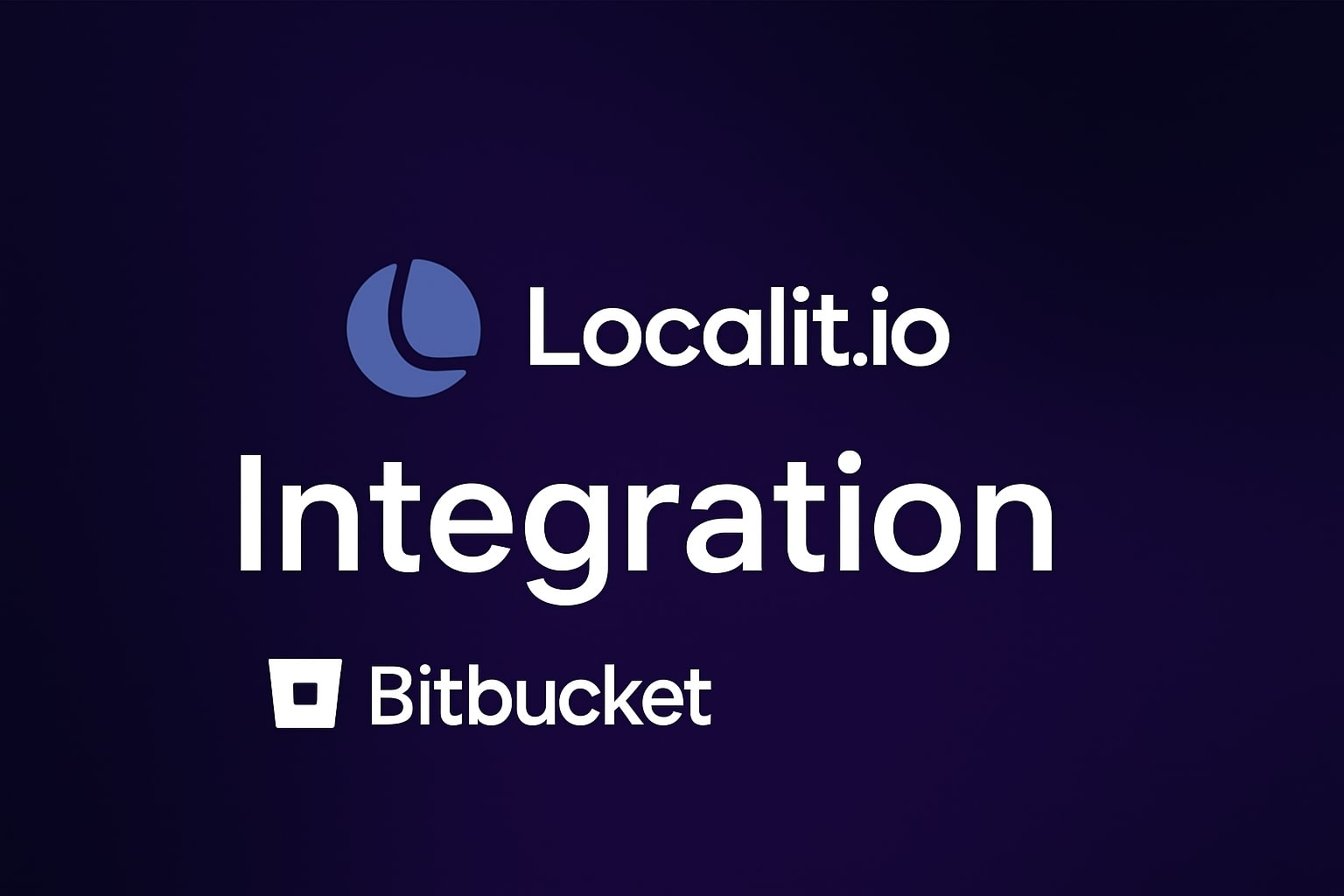Localit.io now offers comprehensive Bitbucket integration, enabling development teams to automate their translation management workflow directly within their existing version control system. This integration completes our Git platform ecosystem alongside GitHub and GitLab support.
What is Bitbucket Integration for Translation Management
Bitbucket integration allows software development teams to connect their Bitbucket repositories directly to Localit.io's translation management system (TMS). This connection enables automatic synchronization of localization files, streamlined translation workflows, and seamless deployment of multilingual applications.
Key Benefits of Bitbucket TMS Integration
Automated Translation Workflow
The Bitbucket integration eliminates manual file transfers by automating the entire localization process. Translation keys are automatically pulled from your repository, processed through our translation system, and pushed back as completed translations.
Enterprise-Grade Security
Supporting both Bitbucket Cloud and Bitbucket Server, our integration maintains enterprise security standards while providing the flexibility needed for corporate development environments.
Cost-Effective Localization Solution
Unlike competitors such as Lokalise, Phrase, and Crowdin that charge premium fees for Git integrations, Localit.io provides complete Bitbucket integration at no additional cost.
How to Set Up Bitbucket Integration
Step 1: Create Bitbucket Personal Access Token
Navigate to your Bitbucket repository settings and create a Personal Access Token with the following permissions:
-
Repositories: Read and Write access for file management
-
Pull Requests: Read and Write for workflow integration
-
Webhooks: Read and Write for automatic synchronization
Step 2: Configure Localit.io Connection
-
Access the Integrations section in your Localit.io project
-
Select Bitbucket from available services
-
Enter your Personal Access Token
-
Choose your workspace and target repository
-
Specify the working branch (main, master, or develop)
Step 3: File and Language Configuration
Configure your localization files by selecting:
-
Platform type (Web, Android, iOS, or custom)
-
Target files from your repository structure
-
Language mappings for each file
Supported File Formats and Platforms
Web Application Localization
-
JSON files (.json)
-
Gettext files (.po, .pot, .mo)
-
Custom text formats
Mobile Application Localization
-
Android: XML resource files (.xml)
-
iOS: Strings files (.strings, .stringsdict)
Specialized Format Support
-
Subtitle files (.srt)
-
Custom localization formats
Pull and Push Operations
Pull Requests (Import from Bitbucket)
Automatically import new translation keys from your Bitbucket repository to Localit.io. This operation synchronizes your project structure and loads all available localization keys for translation.
Push Requests (Export to Bitbucket)
Send completed translations back to your Bitbucket repository automatically. Translated content is pushed to the appropriate language files in your specified branch structure.
Webhook Automation
Configure webhooks for real-time synchronization. When changes occur in your Bitbucket repository, Localit.io automatically updates the translation project without manual intervention.
Translation Management Features
AI-Powered Translation Services
Integrate with leading translation APIs:
-
ChatGPT-5: Advanced context understanding and brand voice preservation
-
DeepL: Superior quality for European languages and technical content
-
Google Translate: Fast processing for over 100 languages
Professional Human Translation
Access professional translators through Gengo integration for mission-critical content that requires human expertise and cultural adaptation.
Team Collaboration Tools
-
Real-time chat with automatic message translation
-
Role-based access control (Owner, Admin, Developer, Translator)
-
Project management and progress tracking
-
Mobile app support for remote translation work
Best Practices for Bitbucket Localization
Repository Structure Organization
Maintain consistent folder structures for different platforms:
iOS Projects:
en.lproj/Localizable.strings
es.lproj/Localizable.strings
fr.lproj/Localizable.strings
Android Projects:
app/src/main/res/values/strings.xml
app/src/main/res/values-es/strings.xml
app/src/main/res/values-fr/strings.xml
Web Projects:
src/locales/en.json
src/locales/es.json
src/locales/fr.json
Branch Management Strategy
-
Use dedicated localization branches for translation updates
-
Configure automatic merging to main branch
-
Implement regular synchronization schedules
-
Monitor webhook functionality for real-time updates
Security and Token Management
-
Apply minimal necessary permissions to access tokens
-
Regularly rotate access tokens for enhanced security
-
Monitor token usage and remove unused tokens
-
Maintain audit logs for compliance requirements
Troubleshooting Common Issues
Token Authentication Problems
-
Verify token permissions match required access levels
-
Check token expiration dates in Bitbucket settings
-
Ensure correct token copying without extra spaces
-
Recreate tokens if permission issues persist
File Synchronization Issues
-
Confirm file paths match repository structure
-
Verify target files exist in specified branches
-
Check file format compatibility with platform requirements
-
Review webhook configuration for automatic updates
Repository Access Problems
-
Ensure token has access to target repository
-
Verify repository is not archived or restricted
-
Check workspace permissions for private repositories
-
Validate branch accessibility and naming conventions
Comparison with Other Git Integrations
GitHub vs GitLab vs Bitbucket Integration
All three Git platform integrations in Localit.io offer identical functionality:
-
Same setup complexity and time requirements
-
Identical file format support across platforms
-
Equal webhook and automation capabilities
-
Consistent security and permission models
Competitive Advantage
While competitors like Lokalise charge $140/month and Phrase charges $125/month with additional fees for Git integrations, Localit.io provides complete Bitbucket integration starting from $0/month.
Getting Started with Bitbucket Integration
Existing Localit.io users can immediately access Bitbucket integration through their project settings. New teams can create free accounts and connect Bitbucket repositories within minutes.
The combination of comprehensive Git platform support, advanced AI translation capabilities, professional translator access, and competitive pricing makes Localit.io the optimal choice for development teams seeking efficient, cost-effective localization solutions.
Start automating your Bitbucket localization workflow today at localit.io and accelerate your global market expansion with streamlined translation management.

 ChatGPT-5 Now Available in Localit.io
ChatGPT-5 Now Available in Localit.io Everything You Need to Know about Mobile App Localization: Challenges + Best Practices of Working in a Different Language
Everything You Need to Know about Mobile App Localization: Challenges + Best Practices of Working in a Different Language Website Localization Issues to Avoid: Translation Challenges, Pain Points, and Solutions
Website Localization Issues to Avoid: Translation Challenges, Pain Points, and Solutions